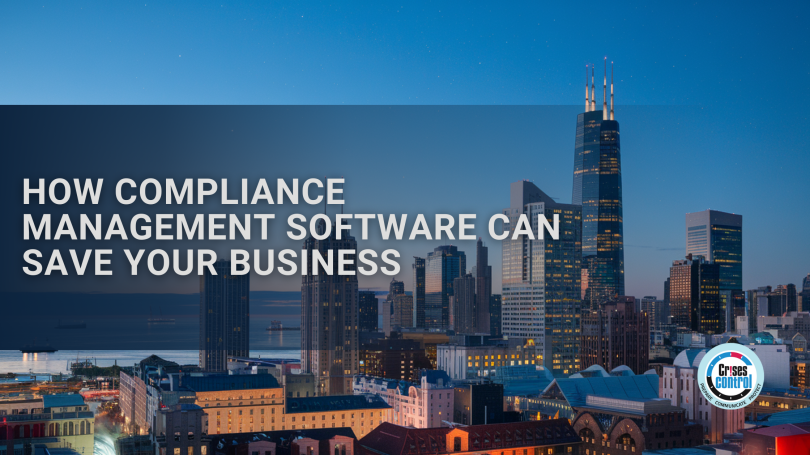Written by Anneri Fourie | Marketing Executive
Did you know that in 2023, GDPR fines exceeded €2.9 billion, with some of the world’s largest companies facing penalties in the hundreds of millions? Compliance failures don’t just lead to hefty fines, they can shut down operations, destroy reputations, and erode customer trust.
Businesses today face a complex and evolving regulatory landscape. Whether it’s DORA compliance (Digital Operational Resilience Act) for financial institutions, GDPR compliance for data protection, or ISO compliance for industry standards, the pressure to stay compliant is higher than ever.
Yet, many organisations still rely on outdated, manual compliance processes, like spreadsheets, emails, and paper-based audits that are time-consuming and prone to human error. A single missed deadline or overlooked regulation can result in financial penalties, operational disruptions, and legal action.
This is where compliance management software becomes essential. By automating compliance tracking, reporting, and alerts, businesses can stay ahead of regulatory changes, minimise risk, and respond effectively to compliance breaches.
In this blog, we’ll explore the hidden costs of non-compliance, the key benefits of compliance management software, and how Crises Control can help businesses integrate compliance with crisis response.
The Hidden Costs of Non-Compliance
Many organisations view compliance as a box-ticking exercise, but failing to take it seriously can have far-reaching consequences. Here’s what’s at stake:
1. Financial Penalties and Legal Risks
Regulatory bodies don’t hesitate to impose massive fines on organisations that fail to meet compliance requirements.
- DORA Compliance: Financial institutions that don’t meet operational resilience standards face severe penalties from EU regulators, particularly for cybersecurity failures.
- GDPR Compliance: The EU’s General Data Protection Regulation can impose fines of up to €20 million or 4% of a company’s global turnover, whichever is higher.
- ISO Compliance: Failure to meet ISO standards can lead to the loss of certifications, which may impact contracts, partnerships, and business credibility.
2. Business Disruptions and Downtime
Non-compliance isn’t just about fines, it can bring business operations to a standstill. Regulatory investigations, security breaches, and sudden enforcement actions can lead to:
- Suspended operations until compliance issues are resolved.
- Lost productivity due to increased administrative workload.
- Difficulty securing contracts with partners that require strict compliance standards.
3. Reputation Damage and Customer Distrust
Trust takes years to build, but only minutes to lose. A compliance failure, such as a data breach under GDPR compliance, can result in:
- Negative press coverage that damages your brand.
- Loss of customers who no longer trust your ability to protect their data.
- Regulatory blacklisting, making it harder to secure business partnerships.
Ignoring compliance obligations is no longer an option. But how can businesses stay on top of changing regulations without overwhelming their teams?
How Compliance Management Software Helps
Instead of reacting to compliance failures, businesses should take a proactive approach by using compliance management software. Here’s how it transforms the way businesses handle compliance:
1. Automating Compliance Tracking and Reporting
Managing compliance manually often means dealing with endless spreadsheets, emails, and paperwork. Compliance management software:
- Tracks regulatory deadlines automatically, reducing the risk of missed obligations.
- Generates compliance reports in real-time, making audits faster and easier.
- Identifies risks early, allowing businesses to fix issues before they become serious problems.
2. Keeping Up with Regulatory Changes
Laws and regulations change constantly, and keeping up can be challenging. Compliance software:
- Provides real-time alerts about regulatory updates, ensuring businesses stay informed.
- Automatically updates policies and procedures in response to new regulations.
- Reduces the risk of accidental non-compliance due to outdated information.
3. Centralising Compliance Documentation
Regulatory audits often require companies to provide detailed records of their compliance efforts. Compliance software:
- Stores policies, risk assessments, and certifications in a secure cloud-based system.
- Enables quick access to documents during audits, reducing stress and delays.
- Ensures document version control, so outdated policies don’t cause compliance failures.
4. Strengthening Crisis Response and Business Resilience
When a compliance breach occurs, businesses must respond immediately to limit damage. Compliance software that integrates with crisis management tools:
- Automates incident response workflows, ensuring the right teams take action quickly.
- Sends alerts to key stakeholders, so everyone is informed in real-time.
- Provides a structured approach to handling compliance failures, reducing panic and confusion.

Why Compliance and Crisis Management Must Work Together
Compliance failures often lead to business crises. A cybersecurity breach, a data privacy violation, or a regulatory audit failure can escalate quickly if not handled properly. Businesses that integrate compliance management with crisis response can:
1. Respond Faster to Compliance Incidents
- Crises Control’s mass notification system ensures that compliance breaches trigger immediate alerts to the right people.
- Incident workflows help teams respond efficiently, reducing downtime and financial impact.
2. Ensure Compliance Tasks Are Completed on Time
- Crises Control’s Task Manager assigns and tracks compliance-related tasks, such as risk assessments and security updates.
- Automated workflows reduce human error, ensuring that no critical compliance step is overlooked.
3. Improve Audit Readiness
- Crises Control’s reporting tools generate real-time compliance reports, reducing manual work.
- Audit trails ensure businesses have the necessary documentation to prove compliance.
4. Minimise Business Disruptions
- When a compliance failure occurs, Crises Control’s Incident Management module provides a structured recovery plan, reducing operational downtime.
How Crises Control Helps Businesses Achieve Compliance
Crises Control offers a comprehensive compliance and crisis management solution, allowing businesses to:
- Automate compliance alerts to stay ahead of regulatory changes.
- Securely store compliance documentation for easy audit access.
- Coordinate compliance breach responses with real-time notifications.
- Streamline compliance workflows with automated task management.
- Generate audit-ready reports to simplify regulatory submissions.
By integrating compliance management with crisis response, Crises Control helps businesses reduce compliance risks, improve resilience, and respond to incidents with confidence.
Why Businesses Must Act Now
Regulations are only becoming more complex. Businesses that fail to adapt risk crippling fines, operational setbacks, and reputational damage. Relying on manual compliance tracking is no longer sustainable, organisations need a proactive, automated approach to stay ahead.
With DORA compliance, GDPR compliance, and ISO compliance shaping the future of regulatory requirements, businesses need a robust solution that doesn’t just track compliance, but actively helps manage risks and crises.
Conclusion: Take Control of Compliance with Crises Control
Compliance failures can shut down businesses, cost millions in fines, and damage reputations. But staying compliant doesn’t have to be a nightmare.
With Crises Control, businesses can:
- Streamline compliance management
- Automate risk tracking and reporting
- Respond to incidents with confidence
Don’t wait for a compliance failure to disrupt your business. Contact us today for a free personalised demo and discover how Crises Control can protect your organisation.
Request a FREE Demo









